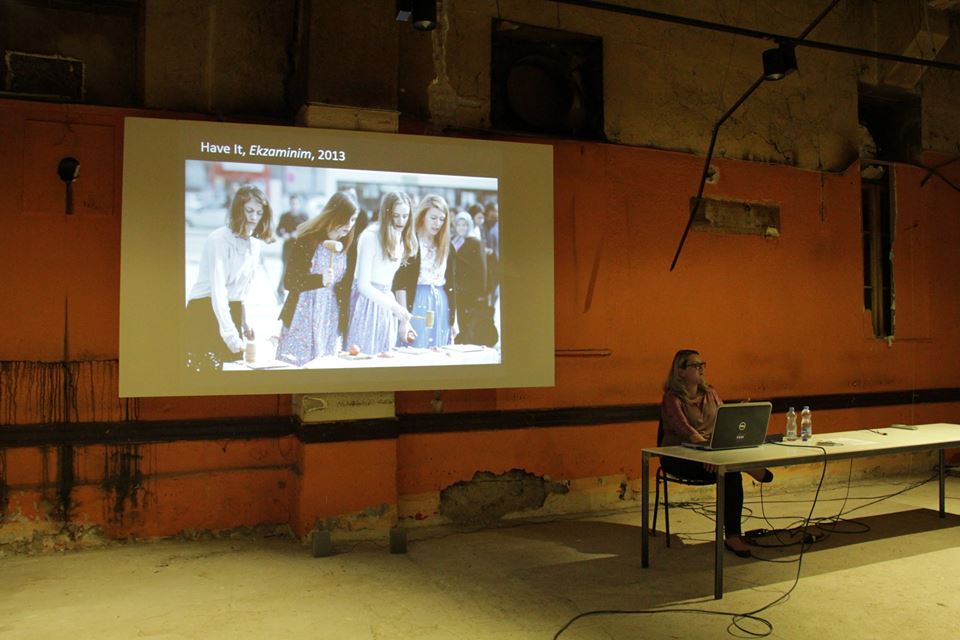
by Nita Luci
Everyday Aesthetics of Power: Urban Space, Art and Publics
5 August, 2015, at 20:00
Venue: Boxing Club
Mark Isaku Street, 10000 Prishtina, Republic of Kosovo
In this paper I conduct an ethnography of contemporary art and analyze the politics of aesthetic representations surrounding manifestations of identity and power. I focus on public performance in Kosovo’s capital, Prishtina, to witness the conflicts and possibilities that contemporary art and public art can inhabit, and in turn look to the ways in which public performances, installations, protests, become part of an everyday negotiation of aesthetics and power. Via Ranciere, I aim “to consider politics not as the mere exercise of power, but the conflict for the framing of a space as political” (2006). I ask: can public art achieve this critique and, if so, what would it look like? The analysis provides a reading of public marketing campaigns, the symbolic architecture of state building, series of commemorative events, protests, contemporary art works, and public art interventions. The aim here is to identify particular regimes of representation, the discursive practices, and the visual repertoire of representations, and the ways in which they enable the demarcation of boundaries between national and gender identities, as well as their relation to political and cultural particularities and more global connections. In particular, I argue that we can treat public art as an experience of the everyday encounter between power and aesthetics where artists in public space negotiate meanings of tradition and modernity.
Nita Luci holds a PhD in Anthropology from the University of Michigan – Ann Arbor. She is a lecturer at the University of Prishtina, Department of Anthropology, and also teaches at the American University in Kosovo. Her research has focused on topics of gender and manhood, state, post-socialism, nationalism, memory, and violence. She heads the University Program for Gender Studies and Research at the Faculty of Philosophy, University of Prishtina. In Spring 2013 she was visiting research scholar at Dartmouth College and fellow at the Gender Research Institute at Dartmouth. In addition to her university engagements she also serves on the boards of a number of civil-society organizations in Kosovo focusing on gender, LGBT, and activism. She has also worked with initiatives in the area of contemporary art, such as editing the publication of four supplements titled “Women n/or Witches: Representation, Feminism and Art.” She also co-founded the independent feminist organization Alter Habitus – Institute for Studies in Society and Culture, which has focused on gender perspectives to post-war collective memory in Kosovo. She has received numerous research grants and fellowships. Her publications include: “Our men will not have amnesia”: Civic Engagement, Emancipation, and Gendered Public in Kosovo (co-authored with Linda Gusia, CEU Press 2014); Masculine Habitus: How to Think of Men in Kosova (2011); Un/welcomed Guests: NATO Intervention in Kosova (Routledge, 2011); Events and Sites of Difference: Mark-ing Self and Other in Kosovo (co-authored with Predrag Markovic, Ashgate 2009); Superfluity: Cultural Policies and Contemporary Art (2008); Gender Equality and Women’s Position in Society in Kosovo (2006); The Politics of Remembrance and Belonging: Life Histories of Albanian Women in Kosova (co-authored with Vjollca Krasniqi, 2006); Transitions and Tradition: Constructions of Gender, Nation and Family in Kosova (LitVerlang 2005); Das Schweigen der Frauen: Genderkonstruktionen und Genderdynamiken in Kosova vor und nach dem Krieg (Lit-verlang 2004); Endangering Masculinity in Kosovo: Can Albanian Women Say No? (2002).
Summer School as School is a project by Stacion – Center for Contemporary Art Prishtina, supported by: Ministry of Education, Science and Technology of the Republic of Kosovo, Culture for all – phase III, Kosova Foundation for Open Society, Friedrich Ebert Stiftung, Ministry of Culture of the Republic of Albania, Ministry of Foreign Affairs of the Republic of Kosovo, Ministry for European Integration of the Republic of Kosovo, Federal Chancellery of Austria, Austrian Federal Ministry for Europe, Integration and Foreign Affairs, Technomarket, Sindikata, X-print and DZG.